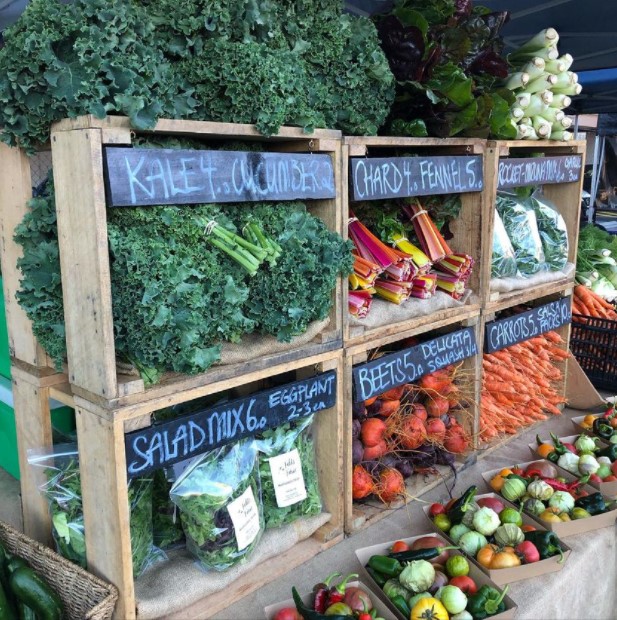Tasmanian organic produce – Why?
As you peruse this site you will notice that nearly all of the producers we mention and most of the restaurants either produce or use all or mostly organic produce. Why?
There are many reasons why we try to only eat and drink organic produce but the reasons can probably be summarised by saying that organic produce tastes better, lasts longer and does your body less damage that conventional produce.
These characteristics are particularly noticeable in fruit and vegetables. We always, in the past, had a summer binge on cherries. We found that the organic cherries from Sakura near Huonville had a much more complex flavour than other cherries we could buy. Unfortunately, this year we didn’t see any cherries from Sakura for sale, so we had to try out different organic producers. We have managed to find a couple of producers in southern Tasmania that are organic and with a good flavour profile.
The same goes for blueberries. Each year we look forward to the blueberries from Jilly Grows, also near Cygnet. These blueberries have a lingering flavour profile that is very satisfying. Once again – this is a hallmark of carefully grown organic produce.
We buy most of our vegetables from Provenance Growers, Rocky Top Farm, Felds Farm, Elgaar Farm, Rise & Shine Farm, York Town Organics, Kindred Organics, KBeeW Honey, Tasman EcoVillage, Grown for Taste, Hobbit Hort, Tamar Valley Organics, Broom and Brine or Seven Springs Farm. We find that organic fruit, nuts and vegetables not only taste significantly better than conventionally farmed products, but they are stronger and therefore last longer and in better condition.
These comments also extend to items made from organic produce. Just prior to writing this story we had a lunch of pasta with tomato and lemon sauce. The tomatoes and lemons were plucked from Sue’s organic garden a few minutes prior to making the sauce and the pasta was made by the clever people at The Grain Family whose farm is near Deloraine in Tasmania. The pasta (rigatoni) was made from organic khorasan (triticum turgidum) which is an ancient form of wheat originating from the Middle East. This dish was a tasty treat with the pasta having an appealing texture from the use of the khorasan.
And this leads us to the third reason why we choose organic produce over produce that has been sprayed. As more and more evidence emerges of the damage that systemic sprays do to human health we become more careful with what we eat.
Just a word about systemic sprays. We both remember our mothers and grandmothers urging us to wash our fruit to wash off the poisons that had be sprayed onto them. Now, systemic sprays, which are the vast majority of sprays, actually enter the plant’s system and hence end up inside the vegetable or fruit. They cannot be washed off.
This has also given rise to some appalling agricultural practices. One is the practice of “drying off” prior to harvesting. This happens with grain crops and potatoes where they are sprayed with a systemic spray, usually based on glyphosates or similar, which enter the grains or potatoes and also dry out the foliage ready for harvest. This also has the added “advantage” that the potato can no longer sprout so none of those pesky shoots appear while they are on display in the supermarket.
Here is where we need to get technical for a minute. If you read the literature put out by the chemical companies that make the sprays they emphasise the fact that many of them work by interrupting a process known as the shikimate pathway. This process is used by plants in the biosynthesis of folates and aromatic amino acids which they need to grow. The sprays interrupt the process and hence kill the plants.
Next, they say that this process is harmless for humans because we don’t have a shikimate pathway. True, we don’t. However, anyone who has followed anything to do with our health over the past decade will know about the vital work carried out by our gut and intestinal bacteria in keeping us healthy. The problem is that these bacteria do use their own shikimate pathway and hence these systemic sprays entering our bodies kill off our vital bacteria.
We have only emphasised one of the bad effects of sprays, there are many others. Therefore, we avoid products that have been sprayed as much as possible.
This also applies to drinks such as wine, cider and beer – an area where Tasmanian producers have been slow to adopt organic practices. We have some shining examples such as Rory Duggan’s exemplary natural wines at R. d’Meure, the biodynamic wines at Stefano Lubiana Wines, the natural cider and apple wine from Banda and the amazing pure beers that have undergone spontaneous fermentation at Two Metres Tall in the Derwent Valley.
However, the good news is that those farmers who have moved to organic agriculture and organic produce, (and here we should pay homage to the Sprout organisation which has done so much good work in encouraging and mentoring farmers who are looking to make the step-up to organics) are finding that more and more people are wanting their products. Just watch the organic produce disappearing off the Felds Farm stand at the Launceston Market on a Saturday morning or the lineup for the Elgaar/The Grain Family stand at the Hobart Sunday Market!

Hopefully, the next step will be a brave Government moving Tasmania to an all organic island to help farmers benefit from the growing move towards purer food and wine.

































